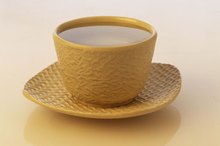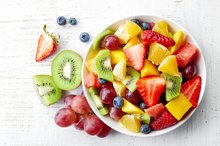Are Lemon Juice and Baking Soda Helpful for Gout?
What you eat and don't eat is an important part of the management plan for those with gout. While there is some preliminary evidence that getting more vitamin C in your diet from foods such as lemon juice may help, it's not a cure for the painful arthritis, and baking soda may worsen your condition. Consult your doctor to discuss alternative forms of treatment for your arthritis before adding them to your daily regimen.
Lemon Juice and Baking Soda Claims
Lemon juice and baking soda are part of a home remedy treatment for gout that is not based on research. Supporters claim that the combination works by reducing the acidity in your blood, including uric acid levels, which is the chemical in the blood that causes the inflammation in your joints. But a review of the current clinical guidelines for gout published in 2012 in Arthritis Care and Research makes no mention of the benefits of either lemon juice or baking soda in treating gout.
Vitamin C and Gout
How to Dissolve Gout Crystals
Learn More
It may actually be the vitamin C content in lemon juice that helps reduce your risk of gout. A 2012 review article published in the international medical journal QJM noted that supplementation with vitamin C may help reduce gout attacks. The juice of one lemon contains 19 milligrams of vitamin C, meeting more than 30 percent of the daily value. You can squeeze the juice from a lemon into your water or tea or on your salad greens.
Baking Soda and Gout
While lemon juice may help your gout, adding baking soda to your daily routine may make it worse. A 2005 study published in Drug and Chemical Toxicology found that feeding broiler chickens an excessive amount of baking soda increased uric acid levels and gout. Human studies need to be conducted to validate findings, however. That doesn't mean you need to avoid baking soda altogether, but you may not want to consume it in large amounts.
Diet to Manage Gout
Buttermilk & Gout
Learn More
Making changes to your diet may help you manage your gout. To start, you can limit your intake of foods high in purines, which include meat, poultry and seafood, to reduce your body's production of uric acid. Instead, fill your diet with plenty of fruits, vegetables and grains. It's also recommended that you drink more water, at least 8 cups daily, to help flush uric acid out of your body.
Related Articles
References
- Health911: Gout
- Patient: Gout Diet Sheet
- Drug and Chemical Toxicology: Gout Induced by Intoxication of Sodium Bicarbonate in Korean Native Broilers
- Arthritis Care and Research: 2012 American College of Rheumatology Guidelines for Management of Gout Part I: Systematic Non-pharmacologic and Pharmacologic Therapeutic Approaches to Hyperuricemia
- Arthritis Care and Research: 2012 American College of Rheumatology Guidelines for Management of Gout Part II: Therapy and Anti-inflammatory Prophylaxis of Acute Gouty Arthritis
- QJM: Recent Advances in Management of Gout
- HealthAliciousNess.com: Nutrition Facts Comparison Tool: Lemon Juice Raw
Writer Bio
Jill Corleone is a registered dietitian and health coach who has been writing and lecturing on diet and health for more than 15 years. Her work has been featured on the Huffington Post, Diabetes Self-Management and in the book "Noninvasive Mechanical Ventilation," edited by John R. Bach, M.D. Corleone holds a Bachelor of Science in nutrition.









